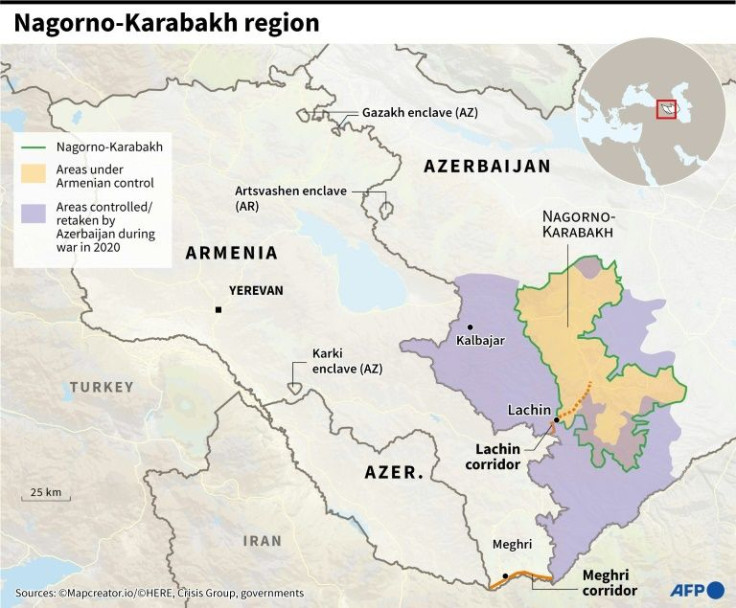Armenia-Azerbaijan Crisis: Can The World Afford Another War?

The American economy is struggling to cope with the pandemic that claimed over 200,000 lives and its administration is too occupied with scouting for allies in its larger Indo-Pacific strategic plan to contain China. Russia has more than it can chew with its unilateral invasion of Ukraine. Turkey's hands are full with its direct participation in all regional theaters of war. Iran is learning to thrive in the midst of the sweeping sanctions imposed by the west. The European Union is plagued by an energy crisis caused by a military flare-up in Eastern Europe, involving Russia and Ukraine. Can the world afford a conflict in Eurasia?
Armenia and Azerbaijan are historical rivals. Their cultural divide extends beyond politics. Christian-majority Armenia is a close ally of Russia, while Turkish-speaking Azerbaijan is mostly Muslim and sees Turkey as its long-time mentor.
The wider South Caucasus is a crucial source of gas and oil transportation from Azerbaijan to Turkey and on to Europe and other global markets.
At the heart of the conflict between Armenia and Azerbaijan is the Nagorno-Karabakh region, part of Azerbaijan, but controlled by ethnic Armenians who are backed by the Armenian government. So far, negotiations by international powers have failed to arrest the conflict.
Nagorno-Karabakh has been an ethnically Armenian region for centuries but the region was assigned to Azerbaijan by the Soviet Union in 1923. Like the decision to assign Crimea to Ukraine in 1954, it was an administrative decision by the communists.
At least 30,000 people have lost their lives in the conflict following the collapse of the Soviet Union in 1991. Both nations were part of the Soviet Union before its dissolution in 1991.
The Armenian population in Nagorno-Karabakh has been resisting Azerbaijani rule and in 1991 they declared independence and the unrecognized Republic of Artsakh was born with the tacit support of the Armenian government.
Azerbaijan, which has been ruled by a single family since 1993, sent the military to respond to Armenian aggression in areas that are legally its territory but occupied by enemy troops and separatists.
The conflict has led to two full-scale wars in the 1980s and 1990s, and a six-week war in 2020 with no end in sight.
In 2007, the Minsk Group, led by the U.S., Russia and France, came up with a political solution, known as the Madrid Principles. But they were not abided by either Armenia or Azerbaijan.
In a sharp escalation of hostilities, Armenia on Sep. 13 claimed that 50 of its soldiers were killed in clashes along the border with Azerbaijan in Nagorno-Karabakh, a landlocked region and the source of dispute for more than a century.
On Sep. 13, Armenia appealed to world leaders for help after several hours of fierce border fighting. Prime Minister Nikol Pashinyan urged world leaders for "an adequate reaction" to "Azerbaijan's aggressive acts".
Armenia said that Azerbaijan used artillery and large-caliber firearms in the cities of Goris, Sotk, and Jermuk while Azerbaijan's defence ministry accused Armenia of large-scale subversive acts" near the districts of Dashkesan, Kelbajar and Lachin on the border.
Turkey prefers to go by the version of Azerbaijan, while Russia has a security pact with Armenia, though it sells weapons to both countries. Moreover, Turkey has soured ties with Armenia. In 1993, it shut its border with Armenia in support of Azerbaijan.
Azerbaijan's current offensive has the full backing of Turkey's President Tayyip Erdogan, as Turkey is trying to strengthen its position in disputes over Syria, Libya, Cyprus, and oil exploration in the Mediterranean region in general. Besides, Russia and Turkey have been jostling for influence in different war-torn nations, including Syria and Libya.
Russia's high stake in the Nagorno-Karabakh conflict - while also fighting in Ukraine - adds uncertainty to the century-old crisis.
Russia is committed to defending Armenia if it is attacked, but Moscow has made it clear that its commitment does not extend to Nagorno-Karabakh.
Iran, more closer to Armenia than Azerbaijan, has everything to lose from an escalating war, so it is calling for peace. However, the large Azeri population in Iran has taken to the streets to support Azerbaijan and protest against the government's bias toward Armenia.
As the flare-up is escalating, the U.S. may try to woo Armenia from Russian influence into a more western, pro-NATO alignment and may exploit the unrest in Iran's Azeri community to exert maximum pressure on Iran in its ongoing campaign.
Maybe the historical rivals are fighting at the wrong time as superpowers have their hands tied somewhere else.





